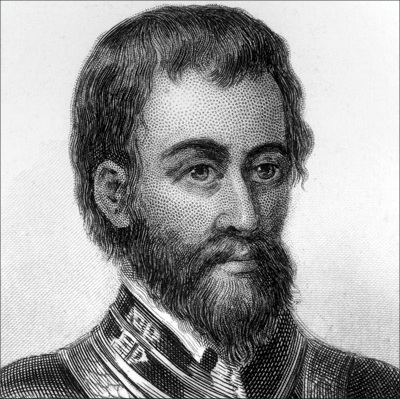Publisher's note: We believe the subject of history makes people (i.e., American people) smarter, so in our quest to educate others, we will provide excerpts from the North Carolina History Project, an online publication of the John Locke Foundation. This forty-seventh installment, by Troy L. Kickler, was originally posted in the North Carolina History Project.
Although scholars disagree regarding the exact path of Hernando De Soto's expedition in the Southeast, all agree that the Spaniard and his expedition passed through present-day Piedmont and western North Carolina.
More than twenty
years before the English landed in what is now North Carolina, France and Spain competed to claim this part of the New World. The Spanish had expressed interest as early as the 1520s: from 1520 to 1525 Lucas Vasquez de Ayllon sponsored three expeditions to Chicora, a land between the Cape Fear and Santee rivers. But Hernando De Soto's expedition marked the first effort of the Spanish government to conquer the land.
Believing he could replicate the financial successes of his countrymen in Peru and Mexico, De Soto "secured permission" in 1539, writes historian William S. Powell, to conquer La Florida (the name for present-day southeastern United States) and establish his own domain. Embarking from Havana, Cuba, in March, he and approximately 500 to 600 men with their livestock and supplies landed in Florida and then traveled northward. They soon reached North Carolina and took a circuitous route through the Piedmont and western mountains before heading into Tennessee and later finding the Mississippi River.
While in North Carolina, De Soto and his men traveled to Chalague (southwest of Charlotte), Guaquili (near Hickory), and Joara (near Morganton), which he called Xuala. After their stay in the latter place, the Spaniards traveled to the mountains and found the French Broad River and the Toe River and the Nolichucky River, which they followed to reach Tennessee.
 Click on the map to get a fully expanded view of Hernando de Soto's exploits as an explorer in the New World: Above.
Click on the map to get a fully expanded view of Hernando de Soto's exploits as an explorer in the New World: Above.
Reports indicate the Native Americans acted generously. The chief of Joara proved to be munificent, and the Cherokees offered food to sustain the Spanish exploration. An unknown tribe gave De Soto 300 hundred dogs, because they noticed the Spaniards ate them. Spanish treated the Indians less kindly, writes historian James H. Merrill. One contemporary recalled that once De Soto "said a thing he did not like to be opposed, and . . . all bent to his will." Expedition reports state that De Soto set dogs on Indians and took hostages to learn information regarding minerals and other riches. (De Soto's tactics affected Juan Pardo's more benign diplomacy as he explored North Carolina.)
Despite De Soto's tactics, his exploration through North Carolina was less than bountiful. No gold, silver, or great waterway was found. Reports, however, indicate that the Spaniards discovered a few, perfect pearls.
The Spaniard eventually found the Mississippi River. The explorer, however, acquired only posthumous fame for discovering the major waterway. Infected with malaria, he died on the river's bank.
Sources:
Charles Hudson, The Juan Pardo Expeditions: Exploration of the Carolina and Tennessee, 1566-1568 (Tuscaloosa, 1990, reprint, 2005); Charles H. Merrill, The Indian's New World: Catawbas and Their Neighbors From European Contact Through the Era of Removal (Chapel Hill, 1989); David G. Moore, "De Soto Expedition" in William S. Powell, Encyclopedia of North Carolina (Chapel Hill, 2006); William S. Powell, North Carolina: Through Four Centuries (Chapel Hill, 1989); L.A. Vigneras, "A Spanish Discovery of North Carolina in 1566" North Carolina Historical Review 46 (October 1969), 398-414.



























